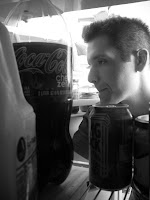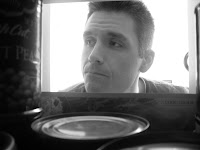Like many of my classmates, I expected a film with a name like Helvetica to be boring, monotone, and dull. I even had a great joke lined up for it, or, more like a line: Helvetica? More like HELLvetica. But, I must say, I couldn’t have been more wrong.
I found Helvetica to be extremely interesting, namely the use of the font in Europe, as well as the incredible surge in its usage when it first became available. I don’t think many of us have ever noticed the number of corporations using Helvetica, yet each one stood out and portrayed a unique message with italics, colors, and shades of boldness.
All this talk of Helvetica almost makes me wish I could convert the font of my blog! Sadly though, it isn't possible.
Monday, February 22, 2010
Sunday, February 21, 2010
Monday, February 8, 2010
Thoughts on Maya Deren's Meshes of the Afternoon
I think there are two avenues of cinematic presentation: one— strictly thoughtless, where everything about the story is given to viewers; or two— thought provoking, which propels viewers to take attention to details amidst sometimes massive confusion. As I watched Maya Deren’s Meshes of the Afternoon, it became apparent that her experimental film was one down the second avenue.
Continuously, images were repeated—the knife, the mirror, the headset left off the phone, the flower—and it was nearly impossible to watch and not search for some kind of symbolic undertone for each one. Thinking of these images, one after another, made me think back to Deren’s essay we read in class—Anagram. I remember Deren talking about humans and animals, and the basic difference between us is that we do not do most things by instinct, but how grow through experience; and that our basic natural faculty of rationale is something that is both a useful tactic, as well as something that drives us batty.
We want reasons, excuses, and logic as to why things happen. When Deren noted that we hold a natural faculty of rationale, I realized it is quite possible that her films, such as Meshes of the Afternoon, were created to make viewers think: why is there a knife? What does the mirror mean? Why do the scenes repeat? Personally, I feel Deren’s film is meant to play with our minds and that same natural faculty of rationale. I think we are not meant to find an answer, but rather, to spend limitless time trying to make something out of nothing. But then again, that’s simply my interpretation.
Continuously, images were repeated—the knife, the mirror, the headset left off the phone, the flower—and it was nearly impossible to watch and not search for some kind of symbolic undertone for each one. Thinking of these images, one after another, made me think back to Deren’s essay we read in class—Anagram. I remember Deren talking about humans and animals, and the basic difference between us is that we do not do most things by instinct, but how grow through experience; and that our basic natural faculty of rationale is something that is both a useful tactic, as well as something that drives us batty.
We want reasons, excuses, and logic as to why things happen. When Deren noted that we hold a natural faculty of rationale, I realized it is quite possible that her films, such as Meshes of the Afternoon, were created to make viewers think: why is there a knife? What does the mirror mean? Why do the scenes repeat? Personally, I feel Deren’s film is meant to play with our minds and that same natural faculty of rationale. I think we are not meant to find an answer, but rather, to spend limitless time trying to make something out of nothing. But then again, that’s simply my interpretation.
Saturday, February 6, 2010
the Pomegranate (phone)
 Check out the sleek and super-multi-functional Pomegranate phone. Browse through each of the incredible features, then once you've seen them all, click "I've seen enough" or "Release Date." You'll be somewhat amazed.
Check out the sleek and super-multi-functional Pomegranate phone. Browse through each of the incredible features, then once you've seen them all, click "I've seen enough" or "Release Date." You'll be somewhat amazed.Photo: Courtesy of Communications Nova Scotia




